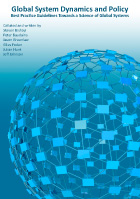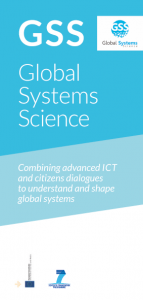Category Archives: Global Systems Science
Global System Dynamics and Policy – Best Practice Guidelines Towards a Science of Global Systems
GSS Flyer
Financial Times video on a new trend in art: Story telling
“For centuries, storytelling was central to the visual arts, until modernism put form and feeling first. Rachel Spence looks at how the story is back in vogue in contemporary art.”
Balance of competences review: Opportunity to contribute on research and innovation
Dear colleagues,
The UK government is currently carrying out a review of the EU’s competences, to understand what the EU does and how it affects the UK. The review has been broken down into a number of individual reports covering specific areas of EU competence. The review started in 2012 and will continue until the end of 2014.
Euclid Network (partner of INSITE and MD) made submissions on two themes- the single market and international development – for the first semester of the UK government’s Review of the Balance of Competences between the UK and the EU.
In the second semester one of the themes on which we propose to contribute is research and development and innovation. The specific questions in the call for evidence are attached and the full document is in the second semester list at https://www.gov.uk/government/consultations/review-of-uk-and-eu-balance-of-competences-call-for-evidence-on-research-and-development . The set of questions is in two parts : impact on the UK national interest; and future opportunities and challenges.
Innovation is a specific topic within scope of this theme and the review will consider the impact of wider EU policies on research and innovation.
It would be helpful to hear from you if there are points that you would wish to see reflected in the submission which would be made to the UK government and published. Contributions from outside the UK are also welcome, especially in terms of best practices and failures from other EU countries.
My colleague Luisa (luisa.deamicis@euclidnetwork.eu) from Euclid will attend the stakeholder event on the 8th of July. Please let us have your initial thoughts by Friday 5th July.
After the stakeholder event, Euclid shall put together a submission and, after testing points with you, meet the closing date of 6th August.
I hope you will contribute in influencing the UK government and the EU on research and innovation policies
Many thanks
Lucas
“Big Data”-workshop June 13: my notes
“Big DATA”, Global Systems Science-conference, Brussels, Wednesday, June 12, 2013.
Notes and ideas:
I. Context:
Global issues, global challenges, “big data”…..
The (9) “Planetary Boundaries”-issues as a representative set of global sustainability issues (“PB”) are complex and interrelated. To deal with the issues – in analysis and in action and for and over the long term- a new approach and methodologies are required in order to deal with the risks while acknowledging the related important uncertainties. “Precaution” should (hence) receive more emphasis in policies and measures to be taken on the basis of amongst others new approaches to risk assessment and risk management: “Integrated Risk Governance” as a relevant option (IRG).
IRG would at the political level deal with the 9 PB-issues with a view to the “best action” taken, today and tomorrow, ideally based on objectives defined in the public interest, on global consensus and bottom-up.
The private sector and the private financial sector generally operate in a market-determined environment and tend to be dominant players (knowledge, knowhow and capital). International and global supply chains driven by the private sector illustrate the scope and importance of the roles of both these actors and the actors in the private financial sector.
Governments would have an interest to “govern” these processes, an interest driven by the need to deal with the “PB”-issues.
Stakeholders becoming increasingly active and present in these processes, both in the world of finance and in the economy, reflecting to a great extent issues of relevance and importance to society.
The four angles have been described in order to play a role in the debate as potentially relevant and priority themes for the proposed “need to reflect on and experiment with how knowledge and foresight are developed and to understand how confidence and empowerment appear in multi-level, multi-stakeholder decision and policy-making making processes….” in the introductory GSS-note for the theme of “Big Data” at the GSS-conference.
The EU would be a relevant and “living laboratory” with elements such as ongoing decision making on the one hand and its relationship with the needed sustainability approach based on e.g. IRG on the other.
II.“Environmental Democracy” and “big data”:
The “Aarhus-Convention” provides a connection for the issue of Big Data with an international legal framework. Currently applied to Europe in UNECE, Latin American countries are now actively considering the option to apply the “tool” of a convention.
“The UNECE Convention on Access to Information, Public Participation in Decision-making and Access to Justice in Environmental Matters was adopted on 25th June 1998 in the Danish city of Aarhus at the Fourth Ministerial Conference in the ‘Environment for Europe’ process. The Aarhus Convention is a new kind of environmental agreement. The Convention:
▪ Links environmental rights and human rights
▪ Acknowledges that we owe an obligation to future generations
▪ Establishes that sustainable development can be achieved only through the involvement of all stakeholders
▪ Links government accountability and environmental protection
▪ Focuses on interactions between the public and public authorities in a democratic context.
An Aarhus-instrument “E-PRTR” (successor of “EPER” European Pollutant Emission Register):
“The European Pollutant Release and Transfer Register (E-PRTR) is the new Europe-wide register that provides easily accessible key environmental data from industrial facilities in European Union Member States and in Iceland, Liechtenstein, Norway, Serbia and Switzerland. It replaces and improves upon the previous European Pollutant Emission Register (EPER). The new register contains data reported annually by some 28,000 industrial facilities covering 65 economic activities across Europe.
For each facility, information is provided concerning the amounts of pollutant releases to air, water and land as well as off-site transfers of waste and of pollutants in waste water from a list of 91 key pollutants including heavy metals, pesticides, greenhouse gases and dioxins for years 2007 to 2010. Some information on releases from diffuse sources is also available and will be gradually enhanced”.
end of quote.
Evolution in environmental law can also be seen by looking at: “ADVANCING JUSTICE, GOVERNANCE AND LAW FOR ENVIRONMENTAL SUSTAINABILITY: “Environmental law is essential for the protection of natural resources and ecosystems and reflects our best hope for the future” (Rio+20 and the World Congress of Chief Justices, Attorneys General and Auditors General):
(a short representation of the main themes):
“…. the World Congress on Justice, Governance and Law for Environmental Sustainability…. The importance of human rights as an essential component of legal strategies for sustainable development, and to highlight specific human rights that are directly related to economic development, social protection and environmental protection.
The 1992 Rio Declaration states in its very first Principle that “human beings are at the centre of concerns for sustainable development. They are entitled to a healthy and productive life in harmony with nature.” The pursuit of inclusive, equitable and
sustainable development can only take place when human beings are the central concern. Therefore, sustainable development is a process that takes place where human beings, and therefore human rights are of fundamental importance.
…. Perhaps no human right is closer to an essential component of sustainable development than the right to health and a healthy environment. The right to health is a human right recognized and protected by the International Covenant on Economic, Social and Cultural Rights. It also has been recognized in the jurisprudence of a number of national courts….
A human right closely related to the right to health is the right to life. The right to life is protected by the International Covenant on Civil and Political Rights, as well as in national laws and constitutions. In India, the Supreme Court observed that the right to life “includes the right of enjoyment of pollution- free water and air for full enjoyment of life….
The right to life may also be thought of more broadly to encompass the right to life of communities and peoples, protected by the International Covenant on Economic, Social and Cultural Rights; and the UN Declaration on the Rights of Indigenous Peoples provides a number of important protections to the native lands and culturally specific way of life of indigenous peoples. In national jurisprudence, the rights of communities and indigenous peoples have often found protection. In a case in Colombia that involved logging on the territory of indigenous peoples, the court found that “the devastation of forests alters their relation with the environment and endangers their lives since with the reduction or disappearance of the forest, the main source of animal protein, is also reduced or extinguished.”
Similarly, in Costa Rica, the court concluded that “the devastation of the forest endangers indigenous peoples’ cultural and ethnic integrity and that these communities were likely to suffer future damages due to their cultural dependence on the tropical forest in which they dwell.”
…..The right to development is highlighted as the third Principle in the Rio Declaration of 1992, which states that “the right to development must be fulfilled so as to equitably meet the developmental and environmental needs of present and future generations.” The right to development in terms of inter-generational equity was addressed at the World Conference on Human Rights held in Vienna in 1993. The Vienna Declaration states that “the right to development should be fulfilled so as to meet equitably the developmental and environmental needs of present and future generations.” At the national level, there is also jurisprudence to support this inter-generational approach”.
end of quote.
“Environmental Democracy” could finally here be seen as part of a broader approach, to democracy and sustainability, as described in an IASS-analysis “Transgovernance: The Quest for Governance of Sustainable Development” (IASS Potsdam, 2011):
“Reflexivity, knowledge democracy and “second modernity”” and “Complexity of problems requires a plurality of solutions, institutions, arrangements…” as concepts to work on.
III. “Applications for solutions by way of opportunities for action”: “Apps4Opps”:
the use of data used in building solutions for sustainability issues and their widest and fastest application:
– the European Environment Agency and “Apps” for mobile phones on its website
– initiatives in society to deal with specific issues, e.g. air quality and the role of Scorecard.org in the USA in how to address air quality issues in a given geographical area
– other examples to build on with a view to further “action”.
Gertjan Storm,
June 2013.
“


